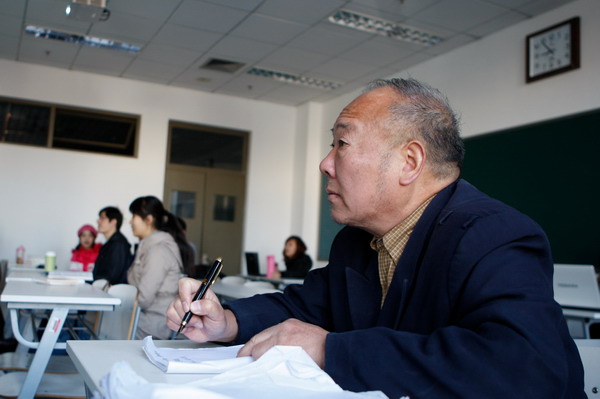Profiles
Life one long classroom
By Zhao Yinan (China Daily)
Updated: 2010-11-30 07:36
 |
Large Medium Small |
|
 Li Wenchao, 68, attends a class at the School of Journalism and Communication at Tsinghua University with his classmates in Beijing on Nov 22. [Zhang Tao / China Daily] |
BEIJING - Instead of sending his children to university, Li Wenchao went with them.
In 2001, when China eliminated the minimum age for college goers, the then 58-year-old man scored the highest among non-school age students and was enrolled by a normal university in Southwest China's Guizhou province.
"The moment I set foot on campus, the sense of fulfillment overwhelmed me," Li said as he recalled his first day in college.
The silver-haired student has continued his studies for nine years.
"At first there was some misunderstanding. People asked what the point is in going to college at such an old age," Li said.
"But they gradually accepted me, and I feel just like a fish in the water with teachers and students."
Distinguishing himself with a washed-out suit and a fountain pen pinned in his left pocket - an icon of typical Chinese intellectuals in the 1960s - Li said studying is "the ultimate mission of life".
After graduating from high school in 1965, Li was assigned to work at a local railway station. Only three months later he was promoted to the public relations office.
"At that time I was the only one who could read, so I was lucky enough to get away from boring labor and sit in the office to write articles," he said.
A true believer of the Chinese idiom which says that in books lay beauty as well as gold, Li found not only his working conditions had changed because of learning, he even won the love of an elegant woman who later became his wife.
"That's the moment I realized one can change one's life by learning," Li said.
Both of his sons, now in their 30s, also graduated from university and are now employed.
After receiving a Bachelor of Arts degree in 2005, Li decided to move onto further studies as an associate student - which allowed him to audit courses for no credit - since he exceeded the age limit for postgraduate and PhD studies in China.
"I'm not eyeing the degree but the knowledge, with which I can resolve both inner struggles and improve relations with others," Li said.
Last month, the 68-year-old arrived in Beijing to attend PhD classes at Tsinghua University, one of the country's most prestigious universities.
"The capital city itself is like a class, with profound cultural, economic and social resources. That's the reason I came," he said.
Li quickly fit into the new life, commuting between his rest house and the school, dropping into the canteen at noon.
"My first class at Tsinghua was about Kant and Hegel's theories. The teacher was very insightful and we had a heated discussion. That's exactly what I've been looking for," he said.
Compared with the younger students in class, Li's grassroots experience and life stories add a unique perspective to understand an otherwise abstruse philosophy.
"I don't have any difficulties understanding the knowledge. Instead, I have found a way to integrate the knowledge with my skills, living experience and the inner struggles that have from time to time confronted all human beings alike," Li said.
Sharing a 10-square-meter room in a basement that has been turned into a rest house not far from Tsinghua University, Li said living expenses in Beijing are higher than in his hometown and he has to make good use of his 2,000-yuan-a-month pension.
Other lodgers at the rest house include young migrant workers, students and fresh graduates.
Sitting on a limp mattress, Li said he feels content with the situation.
His three roommates are all young workers who struggle to earn a living.
Compared with them, Li said he is "the lucky one who can do whatever he likes".